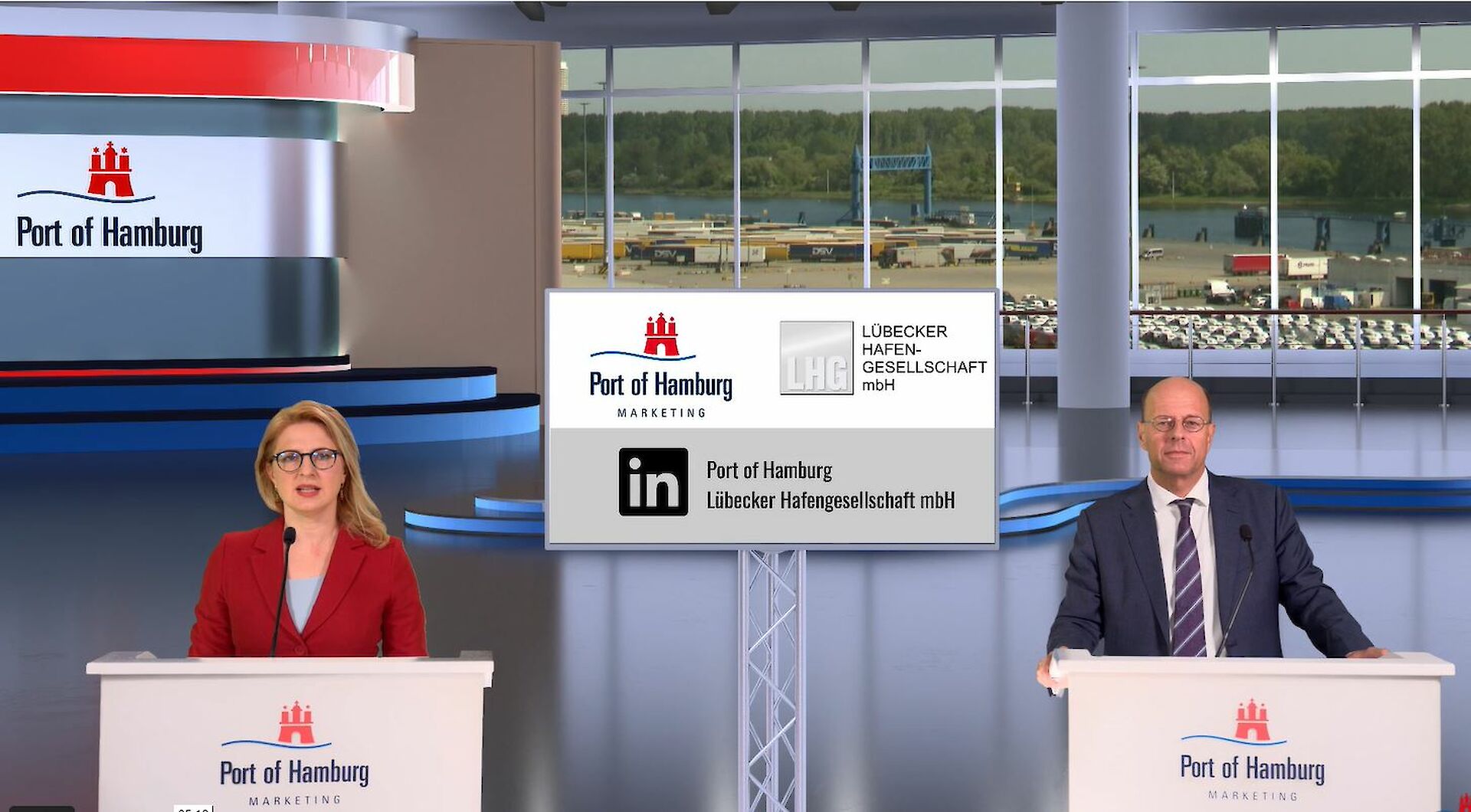

05 Nov 2021 09:00 Environment
With port and logistics centres included, global freight traffic is responsible for eleven percent of worldwide CO2 emissions. A transformation of existing transport chains and logistics processes is being both debated and demanded internationally. In pursuit of climate neutrality, the EU has set out a target by agreeing the European Green Deal. By 2050, Europe should become the first climate-neutral continent.
Lübecker Hafen-Gesellschaft - LHG and Port of Hamburg Marketing - HHM recently invited experts to discuss what measures will be required in the port and transport sector to achieve this target. At a digital event entitled ‘Climate-neutral into the future – What can we do?’, 375 delegates heard lectures and Q&A sessions.
LHG’s CEO Sebastian Jürgens, joined Marina Basso Michael, responsible at HHM for market development in the Baltic region and Europe, in moderating the expert dialogue between the experts and participants linked up from Germany and other countries. “With our event, we want to produce suggestions for the discussion on climate-friendly transport chains and ports. The exchange between the port/transport industry and the academic world produces fresh approaches and motivates people to expand already successfully commenced cooperation at all levels. At the interface between seaborne and land transport, LHG plays an essential part there,” stated Jürgens.
Carlos Jahn of the Fraunhofer Center for Maritime Logistics and Services raised the considerable potential for more sustainability in the port of the future. In his view, synchronization of seaborne and land transport through digital networking of logistics partners needs to be promoted. Jahn feels that deployment of artificial intelligence and use of larger data quantities should enable waiting times to be reduced and preliminary port storage areas more efficiently used. Realtime data on the vessel and its deployment planning should produce substantial added value for optimizing vessel routes and schedules. In the last resort, reduction of fuel consumption, shorter waiting times, smaller space requirement and adjusted equipment also contribute towards more sustainable organization of ports’ hinterland traffic.
Erik Lewenhaupt presented the Stena Line view on further developments in marine propulsion and the use of sustainable fuels in shipping: “Fuels such as hydrogen, ‘green methanol’ plus growing electrification are examples of how we could move in the direction of greener logistics. Electrification is currently preferred for short distances, ‘green methanol’ for the long haul. To promote its use, we shall require not only substantial investments in existing ships, but also supply infrastructure in the ports. Fleet renewals, engine modifications and enhanced efficiency are essential instruments for ensuring structural improvements in the logistics chain and reducing the CO2 footprint. We at Stena Line aim to be pioneers and are promoting sustained transport logistics,” said Lewenhaupt.
Jan Weiser of Kombiverkehr explained how pre- and post-voyage intermodal transport chains can become more environment-friendly. He forcefully demonstrated how combined transport in an intermodal network can achieve an 80 percent saving of CO2 by comparison with road transport. Use of ‘green’ power and precise recording of rail freight traffic emissions can assist here. Thanks to such existing instruments as the CO calculator, customers are already receiving all the basic details for evaluating climate-friendly shipments. On the way to more sustainability in freight traffic, Weiser also called for improved standardisation and suitability of cranes for semi-trailers. In addition, it is essential to convince forwarders about intermodal transport. “Forwarders need to re-think towards rail,” he said.
Jörg Ullrich, CEO of European Cargo Logistics - ECL and Nordic Rail Service - NRS also raised the topic of the potential for optimizing hinterland transport by rail. “With the one-stop shop, booking rail freight shipments needs to be made as simple as for road transport. While retaining competition, we are striving for cooperation between operators and forwarders that simplifies the offer of new connections by rail,” said Ullrich. Along with vertical cooperation, ECL also sees great opportunities in horizontal cooperation for achieving more transparency for all parties thanks to digitalisation and open sharing of transport data. “At the interface of land and sea transport, the port is the key element in the transport chain. A ‘control tower’, so to speak, should logically administer and channel all news and data along the transport chain. This will be an essential module for sustainable development of intermodal shipments. The ports as the interface between intermodal routes are the obvious choice for such a function,” continued Ullrich.
Ortwin Harms, CEO of LHG, sees port infrastructure as needing to adapt to altered ship sizes and consumption of shore power, and its expansion to be of immense significance. “Further optimization of load and discharge processes and adaptation of preliminary storage areas in the port will further improve LHG’s staff and equipment deployment,” stated Harms. Another important goal for LHG, he added, is the use of new cargo handling equipment that as part of further electrification will contribute towards sustainability. As a freight transhipment company, LHG is extremely interested in seeing equipment manufacturers back electrification, and the Federal government produce subsidies for new technologies.
Concluding this event organized jointly with LHG, Basso Michael said that “With its large number of freight handling and transport companies, as well as partner ports in the region, the Port of Hamburg is now already developing successful measures for efficient and environmentally compatible seaborne freight handling and seaport-hinterland transport services. Against this background, we regard innovations and technological excellence as the essential key to an ability to develop sustainable solutions, operate ecologically and trade successfully. In the long run, steadily pursued decarbonization of the transport sector will be the key to positive change.”
Cooperation the key to more environment-friendly shipments
Lübecker Hafen-Gesellschaft
Natascha Blumenthal
Phone +49 4502 807-5310
E-mail natascha.blumenthal@lhg.com